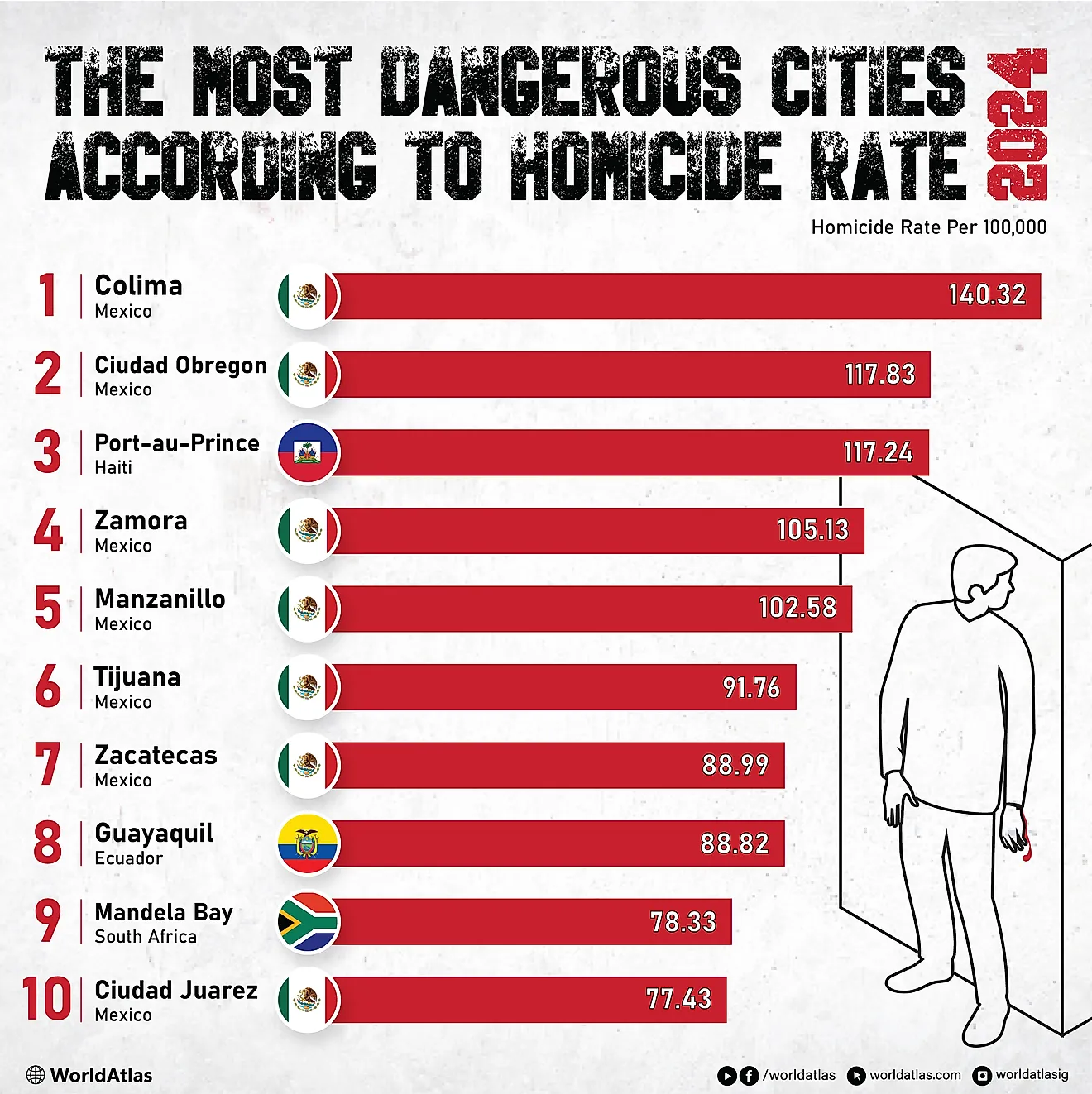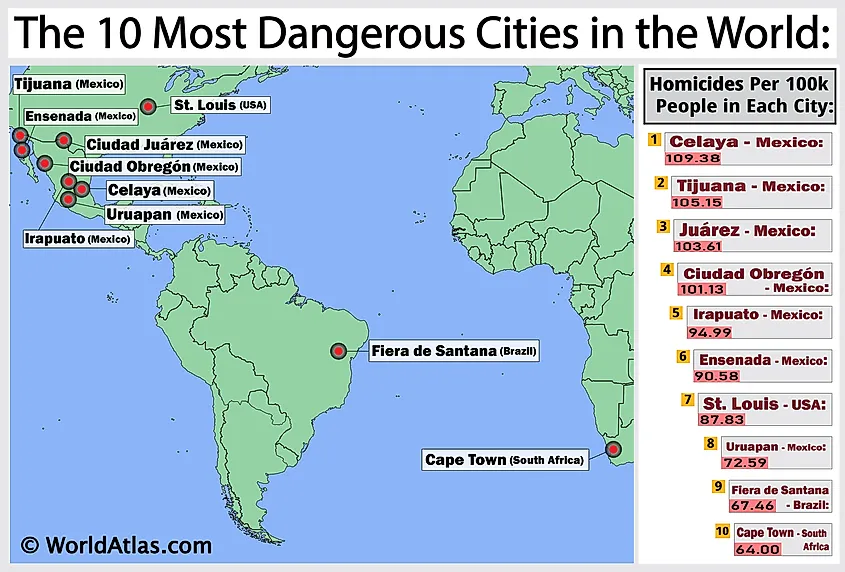Most Dangerous Cities In The World: A Closer Look At The Cities You Should Know About
When we talk about the most dangerous cities in the world, it’s not just about the numbers—it’s about understanding the stories behind them. These cities have become infamous for their high crime rates, political instability, and social challenges. But what really makes a city dangerous? And why should you care? If you're planning a trip or simply want to stay informed, this article will break down everything you need to know.
Imagine walking through a city where every corner feels like a gamble. That's the reality for millions of people living in some of the world’s most dangerous cities. From rampant gang violence to corrupt law enforcement, these places face unique challenges that make them stand out—for all the wrong reasons.
This article isn’t just about scaring you; it’s about empowering you with knowledge. We’ll dive deep into the data, explore the root causes of danger, and highlight what’s being done to improve these cities. So grab a coffee, get comfy, and let’s take a closer look at the most dangerous cities in the world.
Read also:Are Joe Scarborough And Mika Brzezinski Still Married The Inside Scoop Yoursquove Been Waiting For
Why Are Some Cities So Dangerous?
Before we jump into the list, let’s address the elephant in the room: why are some cities more dangerous than others? The answer isn’t as simple as you might think. It’s a combination of factors like poverty, corruption, drug trafficking, and weak governance. Think about it—when people feel like they have no other options, they turn to crime out of desperation.
Take Caracas, Venezuela, for example. Once a thriving metropolis, it’s now one of the most violent cities in the world. Why? Economic collapse, political unrest, and lack of resources have created the perfect storm. And it’s not just Caracas—cities like Tijuana, Mexico, and Acapulco, Mexico, face similar issues.
Top 10 Most Dangerous Cities in the World
Now that we’ve set the stage, let’s get into the main event. Below is a list of the top 10 most dangerous cities in the world, based on homicide rates, gang activity, and overall safety concerns. Each city has its own unique story, so we’ll break them down one by one.
1. Caracas, Venezuela
Caracas has consistently topped the charts as one of the most dangerous cities in the world. With a homicide rate of over 80 per 100,000 residents, it’s no surprise that people are scared to walk the streets. The root cause? Economic collapse and political instability. The government’s inability to provide basic services has left many Venezuelans struggling to survive.
2. Tijuana, Mexico
Tijuana, located right on the U.S.-Mexico border, is another hotspot for violence. Drug cartels and human trafficking rings have turned this once-vibrant city into a battleground. Despite efforts to clean up the city, the violence continues to escalate.
3. Acapulco, Mexico
Acapulco used to be a popular tourist destination, but now it’s known for something else entirely—crime. The city’s homicide rate has skyrocketed in recent years, thanks to drug-related violence and corruption. It’s a sad reality for a place that was once a paradise.
Read also:Is Dylan Dreyer Pregnant Unveiling The Truth Behind The Rumors
4. Cape Town, South Africa
Cape Town is a city of contrasts. On one hand, it’s a beautiful coastal city with world-class attractions. On the other hand, it’s plagued by high levels of violent crime, especially in certain neighborhoods. Gang violence and inequality are major contributing factors.
5. San Pedro Sula, Honduras
San Pedro Sula has long been considered one of the most dangerous cities in Central America. Gangs like MS-13 and Barrio 18 have a strong presence here, leading to frequent clashes and murders. The government has struggled to regain control, leaving residents feeling unsafe.
6. Maceió, Brazil
Maceió, a city in northeastern Brazil, has seen a sharp increase in crime in recent years. Drug trafficking and organized crime are major problems, and the local police force is often overwhelmed. Despite its stunning beaches, the city remains a dangerous place for locals and tourists alike.
7. Natal, Brazil
Natal, another Brazilian city, faces similar challenges to Maceió. The rise in drug-related violence has made it one of the most dangerous cities in the country. While the government has taken steps to address the issue, progress has been slow.
8. Ciudad Guayana, Venezuela
Ciudad Guayana, located in eastern Venezuela, is another city that has been hit hard by the country’s economic crisis. Crime rates have soared, with violent incidents becoming more frequent. The lack of resources and infrastructure has only made the situation worse.
9. Port-au-Prince, Haiti
Port-au-Prince, the capital of Haiti, has long struggled with poverty and instability. Gang violence is rampant, and the government has struggled to maintain order. The city’s infrastructure is in shambles, making it difficult for residents to access basic services.
10. Jos, Nigeria
Jos, located in central Nigeria, has become a focal point for ethnic and religious tensions. Violence between Christians and Muslims has led to frequent clashes, leaving many residents living in fear. The government has struggled to find a solution, and the situation remains volatile.
What Makes These Cities Dangerous?
While each city on this list has its own unique challenges, there are some common factors that contribute to their danger. Here are a few of the biggest culprits:
- Poverty: When people don’t have access to basic resources, they’re more likely to turn to crime as a means of survival.
- Corruption: In many of these cities, law enforcement and government officials are corrupt, making it difficult to enforce the law.
- Drug Trafficking: Drug cartels and gangs thrive in environments where there’s little oversight, leading to increased violence.
- Inequality: Economic and social inequality can fuel resentment and lead to conflict between different groups.
Data and Statistics: The Numbers Don’t Lie
According to the United Nations Office on Drugs and Crime (UNODC), the global homicide rate is around 6 per 100,000 people. However, in the cities we’ve discussed, that number can be as high as 80 or more. That’s a staggering difference, and it highlights just how dangerous these places can be.
In addition to homicide rates, other metrics like theft, assault, and kidnapping are also important to consider. For example, in Cape Town, the rate of carjacking is among the highest in the world. In Tijuana, kidnappings have become a common occurrence, with victims often being held for ransom.
What’s Being Done to Improve These Cities?
While the situation in these cities may seem bleak, there are efforts underway to improve conditions. Governments, NGOs, and community organizations are working together to tackle the root causes of crime and violence. Here are a few examples:
Community Policing
In cities like Cape Town, community policing initiatives have been introduced to help bridge the gap between law enforcement and residents. By fostering trust and collaboration, these programs aim to reduce crime and improve safety.
Economic Development
Addressing poverty is key to reducing crime. In places like Port-au-Prince, efforts are being made to create jobs and improve access to education. While progress has been slow, there are signs of hope.
Rehabilitation Programs
Many cities are also focusing on rehabilitating offenders rather than simply punishing them. Programs that provide education and job training have shown promise in reducing recidivism rates.
Traveling to Dangerous Cities: What You Need to Know
If you’re planning a trip to one of these cities, it’s important to take precautions. Here are a few tips to keep in mind:
- Stay Informed: Keep up with the latest news and travel advisories.
- Stick to Safe Areas: Avoid neighborhoods known for high crime rates.
- Travel in Groups: There’s safety in numbers, so try to stick with a group whenever possible.
- Trust Your Instincts: If something feels off, trust your gut and get out of the situation.
Conclusion: What You Can Do
In conclusion, the most dangerous cities in the world face significant challenges, but they’re not beyond hope. By understanding the root causes of crime and supporting efforts to improve conditions, we can make a difference. Whether you’re a traveler, a resident, or just someone who cares about global issues, there’s a role for you to play.
So what’s next? Leave a comment below and let us know your thoughts. Have you visited any of these cities? What was your experience like? And don’t forget to share this article with your friends and family—it’s always good to stay informed.
Remember, knowledge is power. Stay safe, stay informed, and let’s work together to make the world a better place.
Table of Contents
- Why Are Some Cities So Dangerous?
- Top 10 Most Dangerous Cities in the World
- What Makes These Cities Dangerous?
- Data and Statistics: The Numbers Don’t Lie
- What’s Being Done to Improve These Cities?
- Traveling to Dangerous Cities: What You Need to Know
- Community Policing
- Economic Development
- Rehabilitation Programs
- Conclusion: What You Can Do
Article Recommendations


